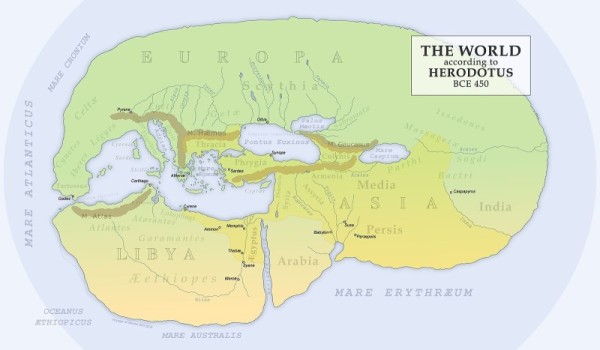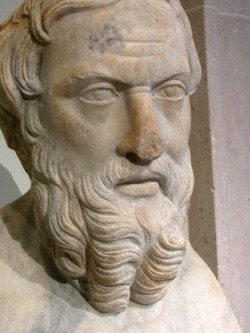To free himself from the oath, he tied the girl on each side with ropes and let her down into the sea, and then drew her up and came to Thera.

Translated by George C. Macaulay — our special project presenting the complete Herodotus with URLs for all of those people, places, events, and things which baffles and discourages modern readers.
Previously on Herodotus
154. This is the report of the Theraians; and for the remainder of the account from this point onwards the Theraians are in agreement with the men of Kyrene: from this point onwards, I say, since in what concerns Battos the Kyrenians tell by no means the same tale as those of Thera; for their account is this: — There is in Crete a city called Oäxos in which one Etearchos became king, who when he had a daughter, whose mother was dead, named Phronime, took to wife another woman notwithstanding. She having come in afterwards, thought fit to be a stepmother to Phronime in deed as well as in name, giving her evil treatment and devising everything possible to her hurt; and at last she brings against her a charge of lewdness and persuades her husband that the truth is so. He then being convinced by his wife, devised an unholy deed against the daughter: for there was in Oäxos one Themison, a merchant of Thera, whom Etearchos took to himself as a guest-friend and caused him to swear that he would surely serve him in whatsoever he should require: and when he had caused him to swear this, he brought and delivered to him his daughter and bade him take her away and cast her into the sea. Themison then was very greatly vexed at the deceit practiced in the matter of the oath, and he dissolved his guest-friendship and did as follows, that is to say, he received the girl and sailed away, and when he got out into the open sea, to free himself from blame as regards the oath which Etearchos had made him swear, he tied her on each side with ropes and let her down into the sea, and then drew her up and came to Thera.
155. After that, Polymnestos, a man of repute among the Theraians, received Phronime from him and kept her as his concubine; and in course of time there was born to him from her a son with an impediment in his voice and lisping, to whom, as both Theraians and Kyrenians say, was given the name Battos, but I think that some other name was then given, and he was named Battos instead of this after he came to Libya, taking for himself this surname from the oracle which was given to him at Delphi and from the rank which he had obtained; for the Libyans call a king battos: and for this reason, I think, the Pythian prophetess in her prophesying called him so, using the Libyan tongue, because she knew that he would be a king in Libya. For when he had grown to be a man, he came to Delphi to inquire about his voice; and when he asked, the prophetess thus answered him:
For a voice thou camest, O Battos, but thee lord Phoebus Apollo
sendeth as settler forth to the Libyan land sheep-abounding,
just as if she should say using the Hellenic tongue, “For a voice thou camest, O king.” He thus made answer: “Lord, I came to thee to inquire concerning my voice, but thou answerest me other things which are not possible, bidding me go as a settler to Libya; but with what power, or with what force of men should I go?” Thus saying he did not at all persuade her to give him any other reply; and as she was prophesying to him again the same things as before, Battos departed while she was yet speaking, and went away to Thera.
156. After this there came evil fortune both to himself and to the other men of Thera; and the Theraians, not understanding that which befell them, sent to Delphi to inquire about the evils which they were suffering: and the Pythian prophetess gave them reply that if they joined with Battos in founding Kyrene in Libya, they would fare the better. After this the Theraians sent Battos with two fifty-oared galleys; and these sailed to Libya, and then came away back to Thera, for they did not know what else to do: and the Theraians pelted them with missiles when they endeavored to land, and would not allow them to put to shore, but bade them sail back again. They accordingly being compelled sailed away back, and they made a settlement in an island lying near the coast of Libya, called, as was said before, Platea. This island is said to be of the same size as the now existing city of Kyrene.

CC BY-SA 2.0 image from Wikipedia.
157. In this they continued to dwell two years; but as they had no prosperity, they left one of their number behind and all the rest sailed away to Delphi, and having come to the Oracle they consulted it, saying that they were dwelling in Libya and that, though they were dwelling there, they fared none the better: and the Pythian prophetess made answer to them thus:
Better than I if thou knowest the Libyan land sheep-abounding, Not having been there than I who have been, at thy wisdom I wonder.
Having heard this Battos and his companions sailed away back again; for in fact the god would not let them off from the task of settlement till they had come to Libya itself: and having arrived at the island and taken up him whom they had left, they made a settlement in Libya itself at a spot opposite the island, called Aziris, which is enclosed by most fair woods on both sides and a river flows by it on one side.
158. In this spot they dwelt for six years; and in the seventh year the Libyans persuaded them to leave it, making request and saying that they would conduct them to a better region. So the Libyans led them from that place making them start towards evening; and in order that the Hellenes might not see the fairest of all the regions as they passed through it, they led them past it by night, having calculated the time of daylight: and this region is called Irasa. Then having conducted them to the so-called spring of Apollo, they said,
Hellenes, here is a fit place for you to dwell, for here the heaven is pierced with holes.
– Herodotus, Book IV
| <—Previous | Master List | Next—> |
Herodotus made his living by being interesting. In a world where most people did not read and could not afford to buy a book even if they could, they would pay to listen to Herodotus recite from his books. They would not pay to be bored. In that world, the names that populate his stories would have some general familiarity to his audience. Their obscurity to us is a barrier that this series seeks to break down.
MORE INFORMATION
MAP LIBRARY
Because of lack of detail in maps as embedded images, we are providing links instead, enabling readers to view them full screen.

Leave a Reply
You must be logged in to post a comment.